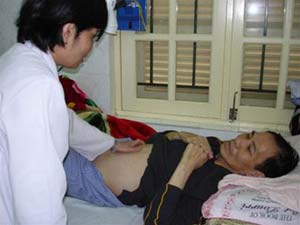To alleviate stress and anxiety for families, as well as to significantly reduce pain for patients, the Department of Nuclear Medicine and Oncology at Bach Mai Hospital (Hanoi) has established a dedicated pain management and symptom care unit utilizing both pharmacological and radiopharmaceutical treatments (the pain relief and quality of life enhancement unit).
 |
| A cancer patient being examined by a doctor before receiving a pain-relieving radiopharmaceutical treatment at the Department of Nuclear Medicine and Oncology, Bach Mai Hospital (Photo: N.Hà) |
Currently, most medical facilities treat cancer-related pain using pharmacological methods, surgery, or radiation therapy. Pharmacological treatments are easy to use and purchase; healthcare facilities can prescribe them, and even families can buy medications according to prescribed instructions for home treatment. However, patients may develop a tolerance to these medications over time.
Doctors may need to increase the dosage or switch to other stronger pain-relieving medications. After a period, the pain-relieving efficacy of these medications will gradually diminish. Additionally, some pain medications can cause side effects such as addiction, gastrointestinal bleeding, and impaired liver, kidney, or bone marrow function…
An advanced pain management method has recently been implemented in Vietnam at several nuclear medicine facilities. This involves treating patients with metastatic bone cancer or primary bone cancer using radiopharmaceuticals. Instead of taking pain medication daily, patients only need a single dose of a radiopharmaceutical, which can effectively reduce pain for 3 to 6 months, or even up to a year, depending on the type of radiopharmaceutical used. The radioactive isotopes will specifically target metastatic cancer lesions in the bones, effectively limiting bone destruction and alleviating cancer pain. Dr. Tran Dinh Ha, deputy head of the Department of Nuclear Medicine and Oncology, stated that the prolonged pain relief following radiopharmaceutical treatment significantly enhances patients’ quality of life.
However, in Vietnam, the use of radioactive substances is subject to very strict regulations, so only nuclear medicine facilities can provide this specialized treatment regimen to manage radiopharmaceuticals, control patient waste, and prevent environmental contamination, thereby protecting those around them. End-stage cancer treatment using radiopharmaceuticals requires regular follow-ups, and depending on the type of radioactive isotope, families may need to pay a range from moderate to quite high costs.
NGỌC HÀ


















































